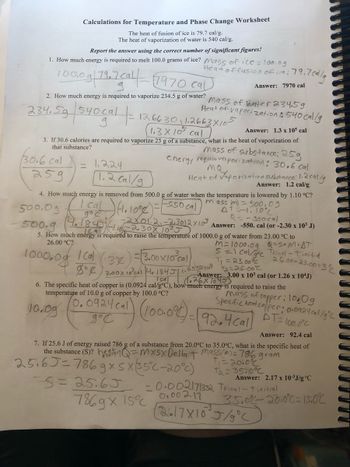
Chemistry
10th Edition
ISBN: 9781305957404
Author: Steven S. Zumdahl, Susan A. Zumdahl, Donald J. DeCoste
Publisher: Cengage Learning
expand_more
expand_more
format_list_bulleted
Concept explainers
Question
Can you help me with the number 5 questions? Also can you please show the step-by-step including the formula?

Transcribed Image Text:Calculations for Temperature and Phase Change Worksheet
The heat of fusion of ice is 79.7 cal/g.
The heat of vaporization of water is 540 cal/g.
Report the answer using the correct number of significant figures!
1. How much energy is required to melt 100.0 grams of ice? Mass of ice = 100.0g
Heat of fusion of ice: 79.
100.0g|79.7.cal-1970 cal
2. How much energy is required to vaporize 234.5 g of water?
234.5g 540 cal-
-
1.224
1.2 cal/g
12 6630 1.2663X105
1.3x105
Answer: 1.3 x 105 cal
cal
3. If 30.6 calories are required to vaporize 25 g of a substance, what is the heat of vaporization of
that substance?
mass of substance: 25g
energy require vaporization: 30.6 Cal
may
30.6 cal
259
26.00 °C?
100c,05 (6બ (22)=xtel
3.00x 10³cal
4. How much energy is removed from 500.0 g of water when the temperature is lowered by 1.10 °C?
mass m) = 500.09
AT=-1.10°C
500.0g (ca.1000) = [
500.g (4.1845 -1.10 23.01.2-2,3012×10³.
-550 cal
5. How much energy is required to raise the temperature of 1000.0 g of water from 23.00 °C to
0.0924 cal
3-21) (100.024)
до с
m= 1000.09 Q=SOMIAT
S=1 cal/goc Teinal-Tinitid
T₁ = 23.00%
T2=26.00°C
3.00 x 10³ cal (or 1.26 x 10¹J)
is required to raise the
mass of copper: 100g
Specific heat copper: 0.0924cal/g °C
AT=100.0°C
Answer: 92.4 cal
7. If 25.6 J of energy raised 786 g of a substance from 20.0°C to 35.0°C, what is the specific heat of
the substance (S)?
= mxsx Delta + mass(m) = 786 gram
T₁ = 20.0%
T₂=35:0°C
-0.002171332 TFinal-Tinitial
0.00217
4184511.2552x10
Içal
6. The specific heat of copper is (0.0924 cal/g°C), how much energy
temperature of 10.0 g of copper by 100.0 °C?
10.09
Mass of water 234.59
Heat of vaporization: 540 cal/g
Heat of vaporization substance: 1.2 cal/g
Answer: 1.2 cal/g
25.65=786 gx sx35°C-20°c)
---5=25.6J
7869x
:79.7 cal/g
Answer: 7970 cal
15°C
Q==ssocal
Answer: -550. cal (or -2.30 x 10³ J)
92.4call
(2617X10³J/g °C
26.00-23.00=3%
Answer: 2.17 x 10-³J/g °C
35.0%-2010°C = 15.0°C
Expert Solution
This question has been solved!
Explore an expertly crafted, step-by-step solution for a thorough understanding of key concepts.
This is a popular solution
Trending nowThis is a popular solution!
Step by stepSolved in 2 steps with 2 images

Knowledge Booster
Learn more about
Need a deep-dive on the concept behind this application? Look no further. Learn more about this topic, chemistry and related others by exploring similar questions and additional content below.Similar questions
- f. g. h. OH HgSO, H₂SO H₂O 1. PCC, DCM 2. CH3Li, Et₂O 3. H₂O + 1. H₂O 2. CH3OHarrow_forwardA 1.58 mole sample of a pure unknown substance has a density of 1.87 g/cm3. If the sample occupies a volume of 188. cm3, what is the identity of the substance in the samples? Element Molar Mass Cadmium 112.411 Francium 223.02 Barium 137.327 Terbium 158.925 Molybdenum 95.95 Terbium Molybdenum Cadmium Francium Bariumarrow_forward1.a What is the molar mass of salicylic acid b. Name the functional groups on the hydrocarbon ring present in salicylic acid. Circle them below. H H H₂ C= O H H Harrow_forward
- 1. What is the mass (grams) of 2500. carbon atoms? 2. What is the mass (grams) of 6.52 x 1018 atoms of gold (Au)? Is this the correct answer including the correct labels?arrow_forward0.10 M formic acid (HCHO₂) Ka = 1.8 x 104 0.10 M sodium formate (NaCHO₂) 0.10 M acetic acid (HC2H302) Ka = 1.8 x 10¹5 0.10 M sodium acetate (Na C₂H30₂) 0.10 M carbonic acid (H₂CO3) Ka = 4.3 x 107 0.10 M sodium bicarbonate (NaHCO3) 0.10 M KOH 0.10 M HCI 0.10 M boric acid (H3BO3) Ka = 5.8 x 10-10 0.10 M sodium borate (NaH₂BO3) 4. Which reagents listed above should be mixed to result in a buffer of about pH 6-8?arrow_forwardAnswer the following question. Show your solutions and box your final answer. What is the mass % of carbon in dimethylsulfoxide, C2H6SO, rounded to three significant figures? What is the weight percent of nitrogen in caffeine, C8H10N4O2? How many number of particles are in 5.0 g of table sugar?arrow_forward
arrow_back_ios
arrow_forward_ios
Recommended textbooks for you
 ChemistryChemistryISBN:9781305957404Author:Steven S. Zumdahl, Susan A. Zumdahl, Donald J. DeCostePublisher:Cengage Learning
ChemistryChemistryISBN:9781305957404Author:Steven S. Zumdahl, Susan A. Zumdahl, Donald J. DeCostePublisher:Cengage Learning ChemistryChemistryISBN:9781259911156Author:Raymond Chang Dr., Jason Overby ProfessorPublisher:McGraw-Hill Education
ChemistryChemistryISBN:9781259911156Author:Raymond Chang Dr., Jason Overby ProfessorPublisher:McGraw-Hill Education Principles of Instrumental AnalysisChemistryISBN:9781305577213Author:Douglas A. Skoog, F. James Holler, Stanley R. CrouchPublisher:Cengage Learning
Principles of Instrumental AnalysisChemistryISBN:9781305577213Author:Douglas A. Skoog, F. James Holler, Stanley R. CrouchPublisher:Cengage Learning Organic ChemistryChemistryISBN:9780078021558Author:Janice Gorzynski Smith Dr.Publisher:McGraw-Hill Education
Organic ChemistryChemistryISBN:9780078021558Author:Janice Gorzynski Smith Dr.Publisher:McGraw-Hill Education Chemistry: Principles and ReactionsChemistryISBN:9781305079373Author:William L. Masterton, Cecile N. HurleyPublisher:Cengage Learning
Chemistry: Principles and ReactionsChemistryISBN:9781305079373Author:William L. Masterton, Cecile N. HurleyPublisher:Cengage Learning Elementary Principles of Chemical Processes, Bind...ChemistryISBN:9781118431221Author:Richard M. Felder, Ronald W. Rousseau, Lisa G. BullardPublisher:WILEY
Elementary Principles of Chemical Processes, Bind...ChemistryISBN:9781118431221Author:Richard M. Felder, Ronald W. Rousseau, Lisa G. BullardPublisher:WILEY

Chemistry
Chemistry
ISBN:9781305957404
Author:Steven S. Zumdahl, Susan A. Zumdahl, Donald J. DeCoste
Publisher:Cengage Learning

Chemistry
Chemistry
ISBN:9781259911156
Author:Raymond Chang Dr., Jason Overby Professor
Publisher:McGraw-Hill Education

Principles of Instrumental Analysis
Chemistry
ISBN:9781305577213
Author:Douglas A. Skoog, F. James Holler, Stanley R. Crouch
Publisher:Cengage Learning

Organic Chemistry
Chemistry
ISBN:9780078021558
Author:Janice Gorzynski Smith Dr.
Publisher:McGraw-Hill Education

Chemistry: Principles and Reactions
Chemistry
ISBN:9781305079373
Author:William L. Masterton, Cecile N. Hurley
Publisher:Cengage Learning

Elementary Principles of Chemical Processes, Bind...
Chemistry
ISBN:9781118431221
Author:Richard M. Felder, Ronald W. Rousseau, Lisa G. Bullard
Publisher:WILEY